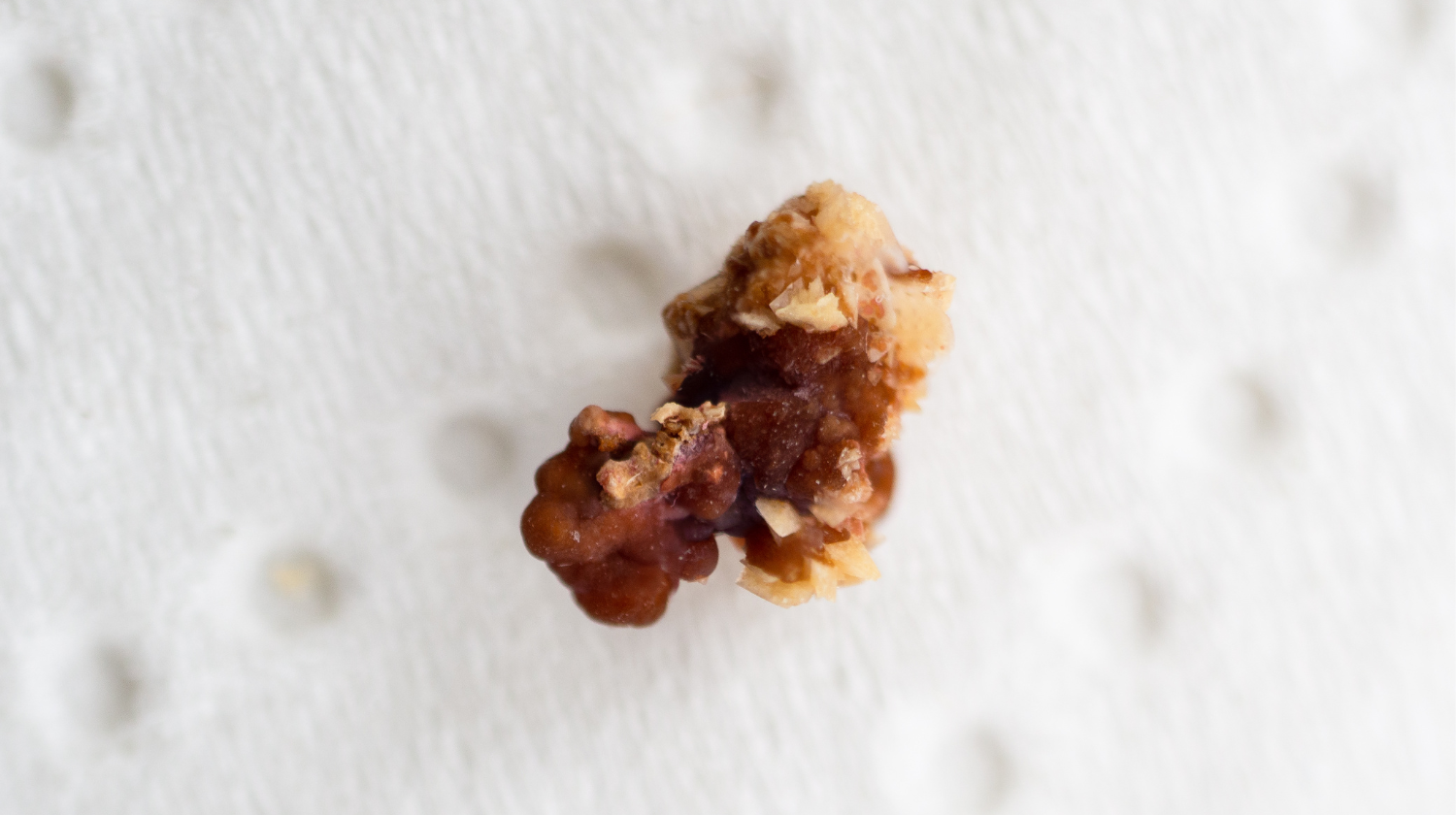How Long Does It Take To Pass A Kidney Stone? What To Expect?

Kidney stones are hard masses that form in the kidneys. They are a widespread condition affecting millions of individuals worldwide. Composed of crystallized substances like calcium, oxalate, uric acid, or struvite, kidney stones can vary in size, from tiny grains to larger stones that can obstruct the urinary tract. Dealing with kidney stones can be a painful and challenging experience, but understanding how kidney stones form, their passage, and prevention can help individuals navigate this condition more effectively.
If you’re looking to learn more about kidney stones, their formation, and how to pass one quickly keep reading!
Tips To Pass A Kidney Stone Quickly
We’re going to break down how and why certain things can help you pass a kidney stone quickly. The most important thing is to prevent kidney stones in the first place, but here is a summary of things that can be done to pass a stone quickly if you already have a kidney stone:
- Drink plenty of water
- Stay active
- Eat diuretic foods
What Is A Kidney Stone?

A kidney stone, medically known as a renal calculus or nephrolith, is a hard mass that forms in the kidneys. It is a common condition that affects millions of people worldwide. Kidney stones are typically composed of crystallized substances, such as calcium, oxalate, uric acid, or struvite. The size of a kidney stone can vary, ranging from tiny grains to large stones that can obstruct the urinary tract.
The formation of kidney stones[1] often occurs when certain substances in the urine become highly concentrated, leading to the crystallization process. Various factors contribute to the development of kidney stones, including dehydration, a diet high in sodium or protein, obesity, certain medical conditions, and a family history of kidney stones. Symptoms of kidney stones may include severe pain in the back or side, radiating to the lower abdomen and groin, blood in the urine, frequent urination, and a persistent urge to urinate.
When a kidney stone is small, it may pass through the urinary system without causing significant discomfort. However, larger stones can cause excruciating pain and require medical intervention. Treatment options for kidney stones depend on their size, location, and the severity of symptoms. Drinking plenty of water and taking pain medications may be sufficient for small stones. In other cases, medical procedures such as extracorporeal shock wave lithotripsy, ureteroscopy, or surgical removal may be necessary.
How Long Does It Usually Take To Pass A Kidney Stone?
The time it takes to pass a kidney stone can vary widely depending on several factors, including the size and location of the stone, the individual’s overall health, and the effectiveness of the treatment measures employed. In general, smaller kidney stones (4 mm or less) have a higher likelihood of passing spontaneously and may take anywhere from a few days to a few weeks to pass through the urinary tract.
Stones larger than 6 mm are less likely to pass on their own and may require medical intervention. The passage of larger stones can be more challenging and may take several weeks or even months. In some cases, if a stone becomes lodged in the urinary tract and causes severe pain or complications, it may require immediate medical attention.
Certain factors can influence the speed of passage. Drinking plenty of fluids, particularly water, can help flush out the stone and facilitate its movement through the urinary system. Medications to relieve pain and promote relaxation of the urinary tract muscles may also aid in the passage of the stone.
Everyone’s experience with kidney stones is unique, and there is no definitive timeline for their passage. If you suspect you have a kidney stone or are experiencing symptoms, it is essential to consult a healthcare professional who can provide an accurate diagnosis, recommend appropriate treatment options, and offer guidance throughout the process.
How To Pass A Kidney Stone Quickly?

Drink Lots Of Water
Drinking an adequate amount of water is essential for the passage of kidney stones. Water plays a crucial role in diluting urine and increasing urine volume, which can help facilitate the movement of stones through the urinary tract. Here’s how drinking water aids in passing a kidney stone:
- Dilution of Urine: When the urine is concentrated, the substances that form kidney stones become more likely to crystallize and clump together, leading to stone formation. By drinking plenty of water, the urine becomes more diluted, reducing the concentration of these substances and minimizing the risk of stone formation.
- Increased Urine Flow: Water intake helps increase urine production, which in turn promotes a higher flow rate through the urinary tract. This increased flow can help wash away small stones and prevent them from becoming lodged or causing blockages.
- Flushing Out Stones: Adequate hydration encourages regular urination, which can aid in flushing out small stones or fragments. The increased volume of urine helps push the stone along the urinary tract, potentially leading to its eventual passage.
It’s important to note that water is the best choice for hydration when it comes to kidney stones. While other fluids may contribute to overall hydration, some beverages like soda or sugary drinks can increase the risk of stone formation due to their high sugar or caffeine content.
To promote the passage of kidney stones, it is recommended to drink at least 8 to 10 glasses of water per day. However, the specific amount of water needed may vary depending on factors such as climate, activity level, and individual health needs. It is best to consult with a healthcare professional for personalized hydration recommendations.
Stay Active
Staying active can potentially aid in the passage of a kidney stone by promoting movement and increasing blood flow. Engaging in physical activity, such as walking or light exercises, can help stimulate the muscles of the urinary system, potentially assisting you to pass kidney stones.
Additionally, physical activity can help reduce the risk of sedentary behaviors, which may contribute to stone formation. However, it is crucial to listen to your body and consult a healthcare professional before engaging in any strenuous activity, as the appropriateness of exercise may vary depending on the size and location of the stone and individual health factors.
Eat Diuretic Foods
Eating diuretic foods can potentially aid in the passage of a kidney stone by increasing urine production and promoting the flushing of the urinary system. Diuretic foods have natural properties that can stimulate the kidneys to produce more urine, helping to eliminate waste products, including small stones or stone fragments. Examples of diuretic foods include celery, watermelon, cucumbers, cranberries, and citrus fruits. However, it is important to note that diuretic foods alone may not be sufficient to pass larger stones, and medical intervention may still be necessary. Learn about the benefits of watermelon and the benefits of berries now!
Tips To Prevent Kidney Stones From Forming
Preventing kidney stones in the first place or preventing more kidney stones from occurring involves adopting certain lifestyle habits and making dietary adjustments. Here are some tips that can help reduce the risk of kidney stone formation:
Stay Hydrated
Drink an adequate amount of water throughout the day to maintain a higher urine volume, which helps dilute urine and prevent you from developing kidney stones.
Limit Sodium Intake
A high-sodium diet[2] can increase the amount of calcium in the urine, leading to stone formation. Reduce your consumption of processed and packaged foods, as they tend to be high in sodium. Opt for fresh, whole foods and use herbs and spices for flavor instead of salt.
Moderate Animal Protein Consumption
Diets rich in animal proteins, such as red meat and poultry, can increase the risk of stone formation. Aim for a balanced diet that includes plant-based protein sources like legumes, tofu, and nuts.
Control Oxalate Intake
Some kidney stones are formed from oxalate crystals[3]. Limit foods high in oxalate, such as spinach, rhubarb, beets, and chocolate. However, it’s not necessary to completely avoid these foods, as they also provide valuable nutrients.
Consume Calcium-Rich Foods
Adequate calcium intake[4] from food sources can actually help prevent kidney stones by binding to oxalate in the intestines and reducing its absorption. Include low-fat dairy products, leafy greens, and fortified plant-based milks in your diet.
Limit Soda and Caffeine
Carbonated beverages and caffeinated drinks like coffee and tea can increase the risk of stone formation. Opt for water or herbal teas as healthier alternatives.
Maintain a Healthy Weight
Obesity and weight gain can contribute to stone formation. Aim for a balanced diet and regular exercise to achieve and maintain a healthy weight.
When To See A Doctor

You’ll want to seek medical attention[5] when experiencing symptoms or complications related to kidney stones. Here are some indications to see a doctor:
- Severe Pain: If you are experiencing intense, unbearable pain in the back, side, abdomen, or groin, it may indicate a kidney stone. Medical evaluation is necessary to assess the stone’s size, location, and potential treatment options.
- Persistent Symptoms: Symptoms like blood in the urine, frequent urination, urgency, or a persistent urge to urinate should not be ignored. These can be signs of kidney stones or other underlying urinary tract issues that require medical attention.
- Infection or Fever: If you develop a urinary tract infection (UTI) accompanied by fever, chills, or other signs of infection, it may indicate a complication related to kidney stones. Prompt medical evaluation is necessary to prevent further complications.
- Obstruction or Severe Blockage: If you experience complete obstruction of urine flow, leading to extreme pain, inability to urinate, or persistent vomiting, immediate medical intervention is essential to relieve the obstruction and prevent further complications. This can occur with the development of a large kidney stone.
- History of Kidney Stones: If you have a history of kidney stones or recurrent episodes, it is advisable to consult a doctor. They can provide guidance on preventive measures, lifestyle modifications, and potential treatment options to reduce the risk of stone recurrence.
Remember that everyone’s situation is unique, and a healthcare professional is the best person to provide an accurate diagnosis and appropriate treatment plan for kidney stones.
Conclusion
Kidney stones are a common and often painful condition that can affect anyone. Understanding the formation, symptoms, and treatment options for kidney stones is essential for managing and preventing this condition.
By adopting healthy lifestyle habits and making dietary adjustments, individuals can reduce their risk of kidney stone formation. Staying hydrated by drinking an adequate amount of water throughout the day helps dilute urine and prevent the concentration of stone-forming substances. Limiting sodium intake, moderating animal protein consumption, controlling oxalate intake, consuming calcium-rich foods, and avoiding soda and caffeine can also contribute to preventing kidney stones. If you want to learn more about how to get rid of kidney stones you’ll want to check out this article.
If symptoms of kidney stones occur, it is crucial to seek medical attention. Severe pain, persistent symptoms, signs of infection or fever, obstruction or severe blockage, and a history of kidney stones are indications to consult a healthcare professional. Prompt diagnosis and appropriate treatment are necessary to relieve pain, prevent complications, and reduce the risk of stone recurrence.
+ 5 sources
Health Canal avoids using tertiary references. We have strict sourcing guidelines and rely on peer-reviewed studies, academic researches from medical associations and institutions. To ensure the accuracy of articles in Health Canal, you can read more about the editorial process here
- Evan, A.P., Worcester, E.M., Coe, F.L., Williams, J.C. and Lingeman, J.E. (2015). Mechanisms of human kidney stone formation. [online] 43(S1), pp.19–32. doi:https://doi.org/10.1007/s00240-014-0701-0.
- Massey, L.K. (2009). Dietary Salt, Urinary Calcium, and Kidney Stone Risk. [online] 53(5), pp.131–134. doi:https://doi.org/10.1111/j.1753-4887.1995.tb01536.x.
- Holmes, R.P. and Assimos, D.G. (2004). The impact of dietary oxalate on kidney stone formation. [online] 32(5), pp.311–316. doi:https://doi.org/10.1007/s00240-004-0437-3.
- Massey, L.K., Roman-Smith, H. and Roger A.L. Sutton (1993). Effect of dietary oxalate and calcium on urinary oxalate and risk of formation of calcium oxalate kidney stones. [online] 93(8), pp.901–906. doi:https://doi.org/10.1016/0002-8223(93)91530-4.
- Miller, N.L. and Lingeman, J.E. (2007). Management of kidney stones. [online] 334(7591), pp.468–472. doi:https://doi.org/10.1136/bmj.39113.480185.80.



